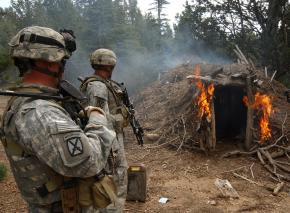U.S. escalates attacks inside Pakistan
reports on the high-stakes conflict taking shape along the Afghanistan-Pakistan border.
IN RECENT weeks, the U.S. has mounted a series of assaults inside Pakistan, marking an alarming escalation of Washington's war in the region.
The attacks included Hellfire missile strikes from unmanned Predator drones that ripped through the homes of Pakistani villagers--and even firefights between Pakistani soldiers and U.S. Special Forces aboard helicopters inside Pakistani territory.
The offensive by American forces based in Afghanistan across the border into Pakistan's Federally Administered Tribal Areas (FATA) reflects the deteriorating state of the U.S. war. The U.S. military is experiencing its highest casualties and numbers killed in action since the war began seven years ago. The Taliban, which fled after the 2001 invasion and set up bases in Pakistan, now has a permanent presence in about half of Afghanistan, and at times poses a threat to supply lines for U.S. troops in Kabul.
The U.S. incursions into Pakistan are an attempt to escalate the war and, in so doing, change the balance of forces and deliver a blow to its chief adversary--in the same way that the U.S. bombed and invaded Cambodia in 1970 in the hopes of avoiding defeat in Vietnam.

Pakistani officials have responded to the U.S. assaults with angry denunciations. "Unilateral action by the American forces does not help the war against terror because it only enrages public opinion," said Husain Haqqani, Pakistan's ambassador to the U.S., in mid-September.
But these criticisms from the government of Pakistan's new President Asif Ali Zardari are largely for public consumption. Zardari, husband of the assassinated Benazir Bhutto, enjoys U.S. support, which has hurt his popularity with the bulk of Pakistanis, who are fed up with U.S. disregard for Pakistani civilians.
This has put Zardari's government in the position of denouncing the most egregious U.S. actions--including the revelation earlier this month that George Bush issued secret orders in July authorizing U.S. Special Forces to stage assaults inside Pakistan without prior approval from the Pakistani government--while supporting the basic aims of confronting the Taliban presence in Pakistan.
The problem, however, is that the pursuit of Taliban forces--and the collateral damage that results from U.S. attacks--has only created more support for the Taliban and allowed it to entrench itself.
The U.S. presence also inflames existing divisions between the U.S.-backed civilian government of Zardari on the one hand and the Pakistani military and intelligence services, which have ties to the Taliban. This same dynamic forced military dictator Gen. Pervez Musharraf, who was seen as a lapdog of the U.S., to resign in August after he suffered a series of electoral defeats.
THE U.S. is caught between a rock and a hard place. The U.S. National Intelligence Council has warned the Bush administration that continuing the commando raids risks further destabilizing the Pakistani government, which could potentially bring to power a government that is hostile to the U.S.
But the Bush administration's position, which is shared by both John McCain and Barack Obama, is that winning the war in Afghanistan depends on uprooting Taliban strongholds in Pakistan.
And it appears that the U.S. is seeking to intensify its military efforts. "The U.S. has bought a huge plot of land at Tarbella [an area in Pakistan's North-West Frontier Province, which borders the FATA], according to sources directly handling the project," writes Syed Saleem Shahzad on Asia Times Online on September 23.
Recently, 20 large containers arrived at the facility. They were handled by the Americans, who did not allow any Pakistani officials to inspect them. Given the size of the containers, it is believed they contain special arms and ammunition, and even tanks and armored vehicles...
There is little doubt in the minds of those familiar with the American activities at Tarbella that preparations are being made for an all-out offensive in North-West Frontier Province against sanctuaries belonging to the Taliban and al-Qaeda, led by bin Laden. Pakistani security sources maintain more American troops will arrive in the coming days.
It should already be clear from the deadly opening stages of this dangerous game of escalation that instead of beginning a new war in Pakistan, the U.S. should withdraw from Afghanistan. But history is filled with examples of empires that refuse to abandon the logic of escalation until forced to confront the fact that they have neither the military capacity nor the domestic support to achieve victory.


